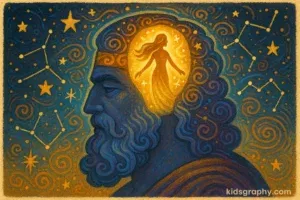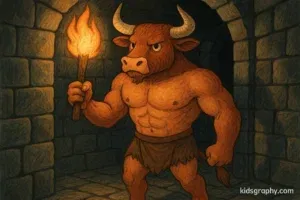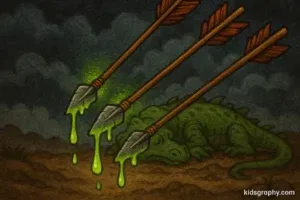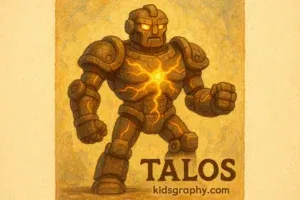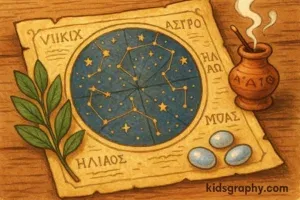When people hear the name Kratos, many think of the fierce warrior from video games. But long before consoles existed, Kratos was a figure in ancient Greek mythology—a powerful being who stood for strength, force, and authority.
Let’s explore the real Kratos in Greek mythology, his origins, his role among the gods, and how he compares to the modern version known around the world.
Read More: Chaos in Greek Mythology: The First Being of Creation
Who Is Kratos in Greek Mythology?
In Greek mythology, Kratos (also spelled Cratos) was the personification of strength and brute force. He wasn’t one of the twelve Olympian gods, but he played an important role in myths about power, loyalty, and punishment.
Kratos is often seen as:
- A symbol of raw physical strength
- A loyal enforcer of Zeus’s will
- A guardian of divine order and punishment
Unlike popular gods such as Apollo or Hermes, Kratos was not worshipped in temples. He was more of a mythical figure who appeared in stories where violence and control were central themes.
Read More: Persephone in Greek Mythology: Queen of the Underworld
Family of Kratos : The Strength-Bound Lineage
Kratos was born from the Titans:
- Pallas, a second-generation Titan
- Styx, the goddess of the underworld river of oaths
Powerful siblings of Kratos:
- Nike – goddess of victory
- Bia – goddess of force
- Zelus – god of zeal and rivalry
Together, they represented the might and discipline Zeus needed to rule after the Titanomachy (the great war between the Titans and Olympians). After the war, Styx and her children were the first to side with Zeus, earning a place at his side forever.
Kratos and his siblings were not just symbols—they were active agents of divine rule, enforcing Zeus’s law in Olympus and beyond.
Read More: Pandora in Greek Mythology: The First Woman’s Curse
Kratos in Greek Tragedy: The Voice of Power
One of Kratos’ most famous appearances is in the ancient Greek tragedy “Prometheus Bound”, written by Aeschylus.
In this play:
- Kratos and his sister Bia are sent by Zeus to chain Prometheus to a rock
- Prometheus is punished for giving fire to humans, which angered Zeus
- Kratos shows no mercy—he commands Hephaestus to bind Prometheus tightly and mockingly defends Zeus’s harsh justice
Kratos stands for unquestioning obedience, raw authority, and the hard side of justice. He believes that divine law must be followed without pity.
This version of Kratos reveals a darker side of power. He isn’t evil, but he is unbending and loyal, even when carrying out cruel tasks. That’s why he’s both respected and feared in mythology.
Read More: Hephaestus: The Amazing Greek God of Fire and Forging!
Is Kratos in Greek Mythology the Same as the Game Character?
In the popular video game series “God of War”, Kratos is portrayed as a Spartan warrior-turned-god, filled with rage and a quest for revenge. While the game draws loosely from Greek myth, its version of Kratos is mostly fictional.
Let’s compare:
| Mythological Kratos | Game Kratos |
|---|---|
| Son of Styx and Pallas | Mortal Spartan turned God of War |
| Represents strength, force | Driven by revenge and guilt |
| Loyal to Zeus | Becomes Zeus’s enemy |
| No worship or temples | Main character of a fantasy saga |
The two versions share the name and themes of strength, but the game version is a reimagined character, not based directly on ancient stories.
Still, the popularity of the game helped revive interest in Greek mythology and introduced millions to the name Kratos.
Read More: Athena in Greek Mythology: Goddess of Wisdom & War
Kratos’ Meaning and Modern Legacy
Today, Kratos represents more than just myth. His name is still used in modern words and symbols:
- “Democracy” (from “kratos” + “demos”) = power of the people
- “Theocracy” = rule by divine power
- “Plutocracy” = rule by the wealthy
In this way, kratos means power, rule, or strength, and it shows up in how we describe governments and authority today.
Whether in ancient plays or modern politics, Kratos remains a symbol of strength and control—a reminder of how power must be used wisely.
The Authority of Zeus and Kratos
Kratos was one of the main enforcers of Zeus’s power. After the Olympians defeated the Titans, the world had to be rebuilt with law, order, and fear of punishment—and that’s where Kratos came in.
Kratos wasn’t kind or compassionate. He didn’t offer advice or warnings. He simply acted when Zeus gave a command. That made him:
- Feared by gods and mortals
- Trusted by Zeus to carry out harsh punishments
- A reminder that no one—god or human—was above divine law
In this way, Kratos helped maintain cosmic balance. He didn’t speak much in myths, but his presence was powerful—like a sword drawn but not yet used.
Read More: Hyperion in Greek Mythology: Titan of Heavenly Light
Kratos and Bia: Force and Violence United
Kratos never worked alone. His sister Bia, the goddess of force and raw energy, often appeared by his side. Together, they formed a duo of unstoppable power.
In “Prometheus Bound,” Bia and Kratos:
- Speak only when needed, and only to command
- Are unaffected by emotions, unlike Hephaestus, who hesitates to punish Prometheus
- Represent the cruel necessity of maintaining order in a world of chaos
Kratos and Bia showed that power wasn’t always gentle. Sometimes, the law must be harsh, and those who uphold it might not be loved—but they are essential.
Kratos in Literature and Philosophy
Though not as popular as Hermes or Apollo, Kratos played an important role in ancient Greek plays and philosophical thought.
Writers like Aeschylus used Kratos to raise questions about power:
- Is it right to obey without question?
- Can justice exist without mercy?
- What happens when strength goes unchecked?
These themes still echo today. In stories, government, and even family life, people ask:
- Should rules be followed no matter what?
- Is there a place for compassion in punishment?
Kratos, even in silence, reminds us of these hard questions.
Read More: Ares in Greek Mythology: God of War and Fury
Kratos in Modern Thought and Popular Culture
Even outside of video games, Kratos has become a symbol in books, comics, and even political language.
- Philosophers use “Kratos” to explore the difference between power and wisdom.
- Fictional characters are often modeled after him—strong, silent enforcers of law.
- The concept of “brute strength without empathy” is linked to how people interpret Kratos.
And of course, the “God of War” video game series reimagined Kratos as a character with depth, flaws, and family pain—taking the idea of strength and asking what it costs.
More Stories: Kratos in Greek Mythology
FAQ: Kratos in Greek Mythology
Kratos is the Greek god and personification of strength, power, and authority. He was loyal to Zeus and enforced divine laws without question.
Yes, Kratos is a real figure in Greek mythology, though not one of the major Olympians. He appears in myths as a powerful enforcer of Zeus’s will.
Kratos symbolizes brute strength, fearlessness, and unshakable loyalty. He carries out divine punishment and represents control through force.
No, Kratos did not have temples or regular worship. He was more of a mythological personification than a god of public devotion.
The game character shares the name and theme of strength but is a fictional creation. The real Kratos in mythology is very different.
Read More: Sirens in Greek Mythology: Deadly Voices of the Sea





